
The Peruvian Aprista Party is a Peruvian political party and a member of the Socialist International. The party was founded as the American Popular Revolutionary Alliance (APRA) by Víctor Raúl Haya de la Torre, who originally intended to create a network of anti-imperialist social and political movements in Latin America. Members are called "companions", based on the fraternity espoused by Haya de la Torre. Originally a centre-left to left-wing party with democratic socialist and nationalist elements, the party moved closer to the political centre under the leadership of Alan García starting in the 1980s, embracing social democracy and later some Third Way policies.
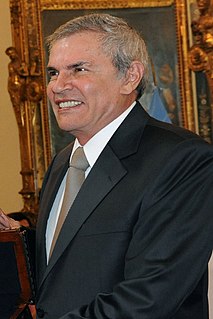
Óscar Luis Castañeda Lossio was a Peruvian politician who was the Mayor of Lima, the capital city of Peru, from 2003 to 2010. He became Mayor of Lima again in 2015, after being elected for a third nonconsecutive term with 51% of the popular vote, for a term that lasted until 31 December 2018. He ran for President of Peru twice, in the 2000 elections placing fifth, prior to his mayoral campaign in 2002, and in the 2011 elections, placing fifth again with 9.8% of the vote.
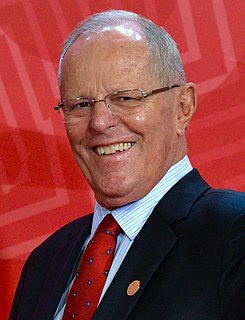
Pedro Pablo Kuczynski Godard, also known simply as PPK, is a Peruvian economist, politician and public administrator who served as President of Peru from 2016 to 2018. He served as the Prime Minister of Peru and Minister of Economy and Finance during the presidency of Alejandro Toledo. Kuczynski resigned from the presidency on 23 March 2018, following a successful impeachment vote and days before a probable conviction vote. Since 10 April 2019 he has been in pretrial detention, due to an ongoing investigation on corruption, money laundering, and connections to Odebrecht, a public works company accused of paying bribes.

Martha Gladys Chávez Cossío de Ocampo is a Peruvian Fujimorist politician and lawyer. A historical and a prominent figure of Fujimorism, she has served in Congress for six-non consecutive terms from 1995 to 2006 and from 2011 to 2016, and since 2020 to finish the 2016–2021 that was interrupted by the dissolution of Congress. In the 2006 elections, she ran for the presidency, running on the Fujimorist Alliance for the Future ticket, but she lost, placing fourth in the election.

Keiko Sofía Fujimori Higuchi is a Peruvian politician. Fujimori is the eldest daughter of former Peruvian president Alberto Fujimori and Susana Higuchi. From August 1994 to November 2000, she held the role of First Lady of Peru, during her father's administrations. She has served as the leader of the Fujimorist political party Popular Force since 2010, and was a congresswoman representing the Lima Metropolitan Area, from 2006 to 2011. Fujimori ran for president in the 2011, 2016, and 2021 elections, but was defeated each time in the second round of voting.
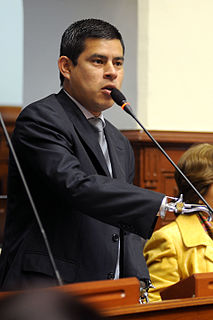
Luis Fernando Galarreta Velarde is a Peruvian Fujimorist politician and a former Congressman representing Lima between 2006 and 2020. He was President of the Congress for the 2017–2018 annual term. Galarreta was part of the presidential ticket of Keiko Fujimori in the 2021 elections that lost the elections to the Pedro Castillo ticket, however, he was elected to the Andean Parliament.
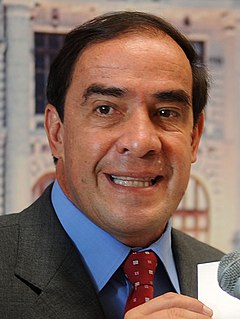
Yonhy Lescano Ancieta is a Peruvian lawyer and politician belonging to the Popular Action party. He was a Congressman between 2001 until the dissolution of the Congress by Martín Vizcarra in 2019. From 2009 to 2011, he served as the Popular Action party's national secretary-general. He was the Popular Action's presidential nominee in the 2021 general election and placed fifth in an atomized race of 18 nominees.

George Patrick Forsyth Sommer is a Peruvian politician and former international footballer.

Popular Force, known as Force 2011 until 2012, is a right-wing populist and Fujimorist political party in Peru. The party is led by Keiko Fujimori, former congresswoman and daughter of former President Alberto Fujimori. She ran unsuccessfully for the presidency in the 2011, 2016 and 2021 presidential elections, all losing by a narrow margin.

Peru Wins was a leftist electoral alliance in Peru formed for the 2011 general election. It was dominated by the Peruvian Nationalist Party and led by successful presidential candidate Ollanta Humala Tasso.

Fujimorism denotes the policies and the political ideology of former President of Peru Alberto Fujimori as well as the personality cult built around him, his policies and his family. The ideology is defined by authoritarianism, its support for neoliberal economics, opposition to communism, and socially and culturally conservative stances such as opposition to LGBT rights and school curriculums including gender equality or sex education. Opponents of Fujimorism are known as anti-Fujimorists.
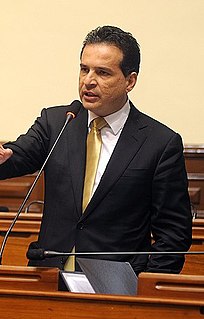
Omar Karim Chehade Moya is a Peruvian lawyer and politician. He worked as consultant lawyer in the Ad Hoc Anti-corruption Prosecution in judicial cases against former president Alberto Fujimori and his intelligence chief Vladimiro Montesinos. He was the Second Vice President of Peru in Ollanta Humala's presidency from 2011 to 2012.
Bernardo Rivero Arenazas was born in 1889 in Callao, Peru and died in Lima in 1965. He is considered one of the greatest Peruvian painters of the early 20th century and one of the pioneers of Peruvian painting. The Law and Political Science Faculty of the Universidad de San Martín de Porres includes Rivero as part of the great masters of the Peruvian painted art and states that between 1890 and 1935 a generation of painters was born, distinguished for their great versatility in the aesthetic field.

Peruvians for Change was a centre-right party in Peru.

Daniel Enrique Salaverry Villa is a Peruvian architect, businessman and politician. Between 2016 and 2019, he served in Congress representing the Department of La Libertad. Elected to Congress under the Fujimorist Popular Force party, he was the party's spokesperson for a year, and was President of the Congress from 2018 to 2019. He ran as a candidate for the presidency of Peru for the We Are Peru party in the 2021 general elections.

The presidency of Pedro Pablo Kuczynski in Peru began with his inauguration on Peru independence day and ended with the president's resignation following a corruption scandal on 23 March 2018.

The 2017–present Peruvian political crisis is an ongoing period of political instability in the Republic of Peru that initially took place between the government of Pedro Pablo Kuczynski (PPK) and allied parties against the majority-Fujimorist Congress.

Free Peru, officially the Free Peru National Political Party, is a Marxist political party in Peru. Founded in 2008 as the Free Peru Political Regional Movement, the party was officially constituted as a national organization in February 2012 by the name of Libertarian Peru. It was registered as a political party in January 2016 and adopted its current name, Free Peru, in January 2019. Its presidential candidate Pedro Castillo won the 2021 Peruvian general election against Popular Force nominee Keiko Fujimori. Free Peru has the second most seats in the Congress of Peru with 22 out of 130 total representatives – but its opposition continued to rule Congress after forming a larger alliance of seats lead by the Popular Action party. Free Peru is a participant in the São Paulo Forum, an annual conference of leftist parties in the Americas.
Hernando Guerra-García Campos is a Peruvian businessman and politician. In 2016, he ran for the Presidency under the National Solidarity-UPP alliance for the general elections for the same year. However, after a few months he withdrew from the electoral campaign. He was Keiko Fujimori's campaign manager in the 2021 general election.

The San Miguel del Ene attack was a massacre on 23 May 2021 in San Miguel del Ene, a rural area in the Vizcatán del Ene District of Satipo Province in Peru, in which 18 people were killed. It was perpetrated by the Militarized Communist Party of Peru (MPCP), a successor of the Maoist terrorist organization Shining Path. The attack was committed in the Valle de los Ríos Apurímac, Ene y Mantaro (VRAEM) conflict region, where the group operates.


















